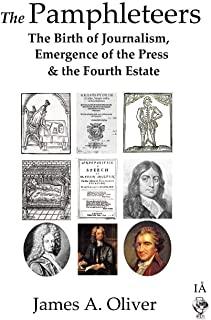
Oliver, James A.
The Pamphleteers is an investigation into the early journalism. In an era long before the advent of the periodical press, the pamphleteers were the world's proto-journalists. As a paper platform for a spectrum of religious fanatics, eccentrics, social reporters and satirists, the pamphlet evolved as a weapon of propaganda (forged between the fledgling press and the censorship of the Star Chamber) for powerful vested interest groups, political parties, governments - and revolutionists. The Guttenberg press of the Renaissance provided the spark and the sixteenth century Reformation the explosive fuel for the pamphleteering phenomenon. As the pamphlet form took root, then so English prose evolved from its antique form to embrace an extraordinary spectrum of literary techniques and styles from cod-polemic to ferocious satire, and beyond. In times of religious ferment, civil war, colonial unrest and revolution, such texts - risky or even dangerous to publish - were as often the product of secret presses and anonymous authors. At the other exposure, there were those who encountered that risk - and found notoriety or lasting fame along the way. In the hands of a select few, the pamphlet reached a level of high achievement beyond any ordinary Grub Street reckoning. In this brief survey, the author includes vignettes on seven pamphleteers: Robert Greene, Thomas Nashe, Thomas Dekker, John Milton, Daniel Defoe, Jonathan Swift, and culminating with Tom Paine. The narrative shows how the work of the early journalists was driven, not merely by scandal and sensationalism, but by major historical events on the world stage: the Reformation, the English Revolution, the War of the Spanish Succession, and the revolutions in America and in France. These are the great political tides that led to the birth of journalism, the periodical press, and the emergence of the fourth estate. The Pamphleteers is itself a pamphlet for the digital age.
member goods
notems store

Disney Junior T.O.T.S.: Time to ...
by Editors of Studio Fun International
Hardcover /Board Books$6.74






